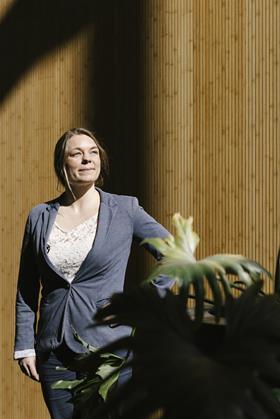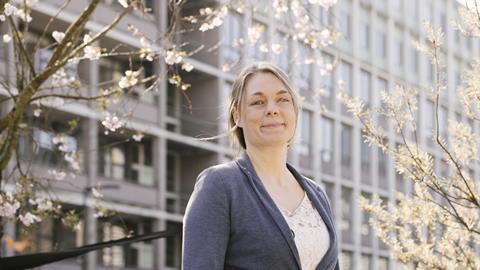Scientist Marthe Wens (32) is active in Scientist Rebellion. She learned to protest step by step. ‘At first, I watched from the sidelines until I was ready to take action myself.’
One day Marthe Wens is researching the effects of drought. The next day, she is blocking the A12 motorway in The Hague to demand an end to fossil fuel subsidies. Wens is a lecturer at the Institute for Environmental Studies at the Free University of Amsterdam and an activist with Scientist Rebellion, a sister organisation of Extinction Rebellion. ‘When we take action, we always win’, says Wens. ‘Either we achieve our goal and get our message across, or we get media attention, for example when our right to demonstrate is taken away and the police repress us, and even then we get our message out.’
Wens’ activist drive was fuelled by her work. Something clicked when the drought researcher met with policymakers in Botswana a few years ago to discuss the increasing risk of drought and its impact on agriculture. ‘No matter how well people adapt to drought, the consequences keep coming. That’s why I advised them to tackle the root cause: climate change.’ Then came the moment of truth. ’How can I, as a Western scientist, tell the people of Botswana that they need to fight climate change when the Dutch government doesn’t even keep its own climate promises?
False trust
The Netherlands bears a great responsibility for the climate crisis, and scientists have an important role to play, says Wens. ’In society, scientists are seen as trustworthy. If scientists don’t speak out, it creates false trust. She also saw this in her mother. ’She trusted that “we” would find a solution to the climate crisis, otherwise we wouldn’t be so calm about it, would we? In reality, the solutions already exist. It’s the politicians who aren’t implementing them.
One of Wens’ recent actions was a protest at Schiphol Airport against frequent flyer programmes. On International Women’s Day, she and other rebels from Scientist and Extinction Rebellion stopped the treadmills at the airport. ‘In my research, I see that women in the global south are having to walk further and further to fetch water because of increasing drought. Meanwhile, frequent flyer programmes encourage people to fly even more, exacerbating the climate crisis.’ Wens was surprised by how many people wanted to hear her story. ‘We even got a few thumbs up from passers-by.’
Disobedience
Wens’ activism did not start with blocking a motorway or an airport. She started small, visiting websites and filling in forms. ‘That’s how I discovered what was possible. After a few months, I dared to attend an information meeting. Then I watched protests from the sidelines until I was ready to take part myself.’ Step by step, Wens discovered how well the action groups were organised. A’lmost no one grows up with the civil disobedience that characterises Extinction Rebellion. We are all stepping out of our comfort zones, and everyone finds that scary. That’s why we support each other, both mentally and physically. You can rely on each other and that gives us energy, strength and hope.’

Who is Marthe?
What did you study and where?
‘Bachelor and Master in Geography at KU Leuven and VU Brussels. PhD at the Institute for Environmental Studies at the VU Amsterdam.’
What motivates you in your work?
‘Drought risk is interesting because it’s so insidious. You don’t see that there is no water. I want to create visibility and awareness.’
What are your ambitions?
‘I want to do everything I can to convince politicians that we cannot ignore the climate crisis.’
What is your advice or tip?
‘Find out what kind of activism suits you and start small. For example, sign a petition or write a letter to a politician.’













Nog geen opmerkingen